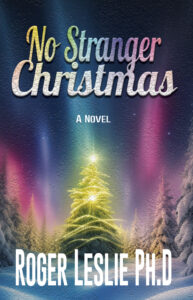Characters Need to Fascinate by Roger Leslie, PhD
As classic children’s author Robert Newton Peck asserted in the title of his book on writing, Fiction is Folks. More than anything, readers care about characters. Making them vivid is essential for any excellent fiction. Fortunately for writers, there are as many ways to make characters fascinating as there are books to read.
Make Them Real
Generally, my characters are a composite of several people. At the core, I model a character after someone’s personality. From there, I piece together a happy patchwork of physical traits, catchphrases, and idiosyncrasies from various people I know. One character might have my favorite cousin’s personality. But then I may give her a distinct birthmark I recalled a neighbor having in my childhood. Not every trait comes from the past. I could even add a tic I noted from the checker who rang up my purchases at the grocery store this week. Every swatch in this tapestry of traits comes from an actual person. Confident needlework from the author can make the pieces snug, and quilting thick with authenticity will invite readers to curl up with the good book the characters inhabit.
Make Them Distinct
Many writing books warn against flat characters—those who don’t have multiple nuances and who do not develop or change over the course of a novel. Just as disappointing to readers are indistinct or nondescript characters. As I write, I don’t necessarily have to know everything about all my characters from the start. In fact, I don’t want to. Some of the greatest fun of writing a first draft is discovering new aspects of characters as I write.
Ultimately writers must know who all their central characters are. Ideally, each character will have an arc. They will start out in the novel one way, will be somehow changed (for the better or not) by the end. In between, story details will reveal what happened to and with that character that accounts for their transformation. Character arcs are as intriguing and essential to readers as story arcs. The story, the characters, and the world they inhabit start out one way. The plot develops with advances and setbacks. Characters grow, err, and become different than they were before. The end result will be a satisfying story conclusion, a changed character, and a new world.
Make Them Relevant
I’m currently on draft 13 of a novel. Even so far into it, I don’t have a strong grasp of one minor—but pivotal—character. I started out thinking I knew him. Visually, I know his stature, his posture, his distinguishing traits. They come through clearly enough as I write for me to be able to “see” him in his scenes. Through his dialog, I can “hear” his distinct dialect. But the personality I thought I wanted him to have when I started the first draft does not fit the purpose he took on in the plot. (Ah, the glorious opportunities revision invites!) Who this character is in relation to his actions (a paramount story changer) and in relation to the central characters (who are all impacted by his questionable choices) require him to be mysterious yet vivid to readers.
Instead of creating him before I write, I am finding him as I write. For him, I’m sewing the patches without following a pattern. The multiple drafts have given me several disparate swatches that only seem harmonious after I’ve connected them. Although I don’t know what his final quilt will be, he’s becoming clearer with each new row. As I work, I’m stitching together pieces of a mystery.
Research for this kind of mystery requires me to delve into real life. I explore how people I know change. I examine how I learn new bits of information about people that lead me to draw new conclusions about who they really are. Getting to know the people in my own life is fascinating. In some cases, I discover new facets of someone I didn’t know they had. At other times, I come to know and think I understand aspects of their inner life that I don’t relate to or am grateful aren’t me. I like finding new pieces. It’s fun figuring out where they belong. It’s captivating and sometimes surprising to piece together a character so different from the one I thought I would create for this novel.
Make Them Fascinating
Writers who approach people with curiosity and intrigue create characters that can fascinate readers. Throw any judgment into their observations and the writer might build insurmountable walls that divide themselves from their characters and readers. Astute readers can tell if authors don’t like their characters. Even if antagonists commit horrible acts, great authors can convey a sense of intrigue about them that makes them magnetic and unforgettable to readers.
As a librarian years ago, I ordered a book for the collection. It was a huge bestseller that had won several prestigious awards. After hearing the author interviewed, I concluded that I wouldn’t care to know him. To put it kindly, he thought very highly of himself. I kept an open mind. If his talent was that prodigious, I wanted to read this novel in hopes of enjoying a good read and learning from a master writer.
The disdain he conveyed for the first two characters he introduced did not make me dislike them, but further put me off to the author. The arrogant narrative tone and the insulting descriptions of these two middle-class, middle-aged characters was so off-putting I didn’t read past the first chapter. Readers want to love characters or despise them so much for their fascinating flaws that they can’t wait to keep turning pages to see what they’ll do next. That visceral response comes through at most when authors love their characters, or at least when they are so intrigued by them that they captivate readers.
Should characters be loveable? Maybe. Should they be vivid? Certainly. But readers will find them unforgettable if they’re real, distinct, relevant, and fascinating.
Here’s a look at Roger’s latest release No Stranger at Christmas:
 Teased by his brothers.
Teased by his brothers.
Tricked by a school rival.
Tailed by a vengeful stranger.
Frankie’s Christmas Eve nativity puts him center stage. He’ll either come out on top . . . or six feet under.
While trying to save Christmas for his financially struggling family, 14-year- old Frankie Lincoln finds the courage to explore his artistry, stand up to gay discrimination, and pursue first love.
ABOUT THE AUTHOR:
Dr. Roger Leslie is a scholar in the fields of success and education. Through major literary houses, medium and small presses, and his own publishing house, Leslie has published fiction and nonfiction books in multiple genres: historical fiction, inspirational self-help, spirituality, writing and publishing, movie reference, teaching and librarianship, biography, history, and memoir.
Leslie has won numerous national awards including ForeWord Book of the Year, The Ben Franklin Award, and Writer’s Digest’s #1 Inspirational Book of the Year. At its inaugural event, Leslie received the Houston Literary Award for his body of work.
Leslie is in demand as a teacher, coach, and keynote speaker. He leads FLY (First Last Year) courses based on his blockbuster memoir, My First Last Year. He draws from decades as an author, editor, and publisher to coach writers in groups and individually. He is also a sought-after speaker for his lively, entertaining keynotes relating award-winning movies to any topic or group.
In every book and presentation, Leslie entertains, inspires, and empowers people to live the life they dream and soar toward their own ideal of success. For more, visit RogerLeslie.com.






